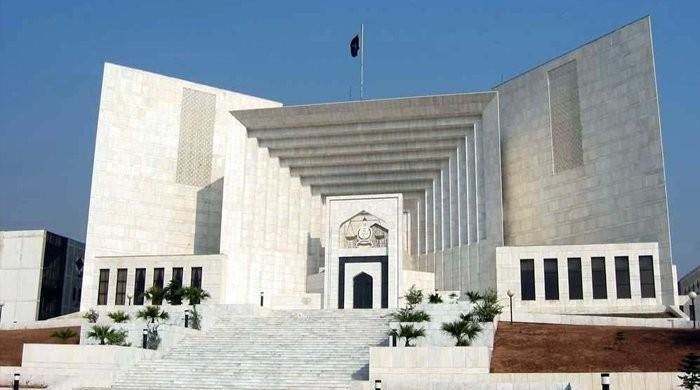SC tells govt to legislate NAB laws within three months
 Supreme Court of Pakistan. Photo: File
Supreme Court of Pakistan. Photo: File
ISLAMABAD: The Supreme Court on Wednesday instructed the Pakistan Tehreek-e-Insaf (PTI)-led government to legislate on the National Accountability Bureau's (NAB) laws within three months or the court would step in and adjudicate as per law and merit.
The court also barred the corruption watchdog from exercising the right to offer plea bargains until the parliament has legislated on the matter.
The top court issued the directives during the hearing of a suo motu case pertaining to Clause 25-A of the NAB Ordinance. Under the controversial clause, the NAB chief is empowered to accept a voluntary return of assets from an accused, who can then avoid any investigation into the alleged wrongdoing.
Also read: Profile: Chief Justice Gulzar Ahmed
In remarks made during the court proceedings today, Chief Justice of Pakistan (CJP) Gulzar Ahmed said "amending the NAB laws is the prerogative of the parliament, adding that "the government should not prolong the legislation on this matter."
Justice Ahmed further said that the court had already asked NAB to stop offering plea bargains until the parliament has exercised its power and legislated on the issue.
"Until the parliament legislates on the matter, the powers granted under Clause 25-A cannot be exercised," CJP Ahmed said.
Also read: Cabinet approves NAB Amendment Ordinance 2019
CJP Ahmed also warned that if the court stepped in and repealed the laws of the accountability body, it could render the NAB powerless. "Does the government want that the NAB laws be repealed?" he remarked during the hearing.
"The government has clipped the wings of NAB with the new amendments," CJP Ahmed remarked regarding the NAB Ordinance, 2019, under which a host of restrictions were placed on the bureau.
What is clause 25-A?Clause 25-A of the NAB ordinance pertains to voluntary return and plea bargain.
"Not withstanding, anything contained in section 15 or in any other law for the time being in force, where a holder of public office or any other person, prior to the authorisation of investigation against him, voluntarily comes forward and offers to return the assets or gains acquired or made by him in the course, or as the consequence, of any offence under this Ordinance, the Chairman NAB may accept such offer and after determination of the amount due from such person and its deposit with the NAB discharge such person from all his liability in respect of the matter or transaction in issue: Provided that the matter is not sub judice in any court of law," the clause states.
What is NAB ordinance 2019?The federal cabinet had last month given approval to NAB Ordinance, 2019. Under the new law, NAB would no longer be allowed to take action against government employees.
Moreover, the ordinance also stated that the property of government employees could not be frozen without a court order. Furthermore, if the accountability watchdog could not complete an investigation against a suspect within three months, the accused would be entitled to bail.
In addition, NAB would now only be able to proceed in corruption cases of Rs500 million and more. According to the amendment ordinance, NAB's jurisdiction over matters relating to tax, stock exchange and IPOs had been curtailed as well.
However, a day later the government took back the majority of the amendments circulated to the cabinet by the law ministry after major opposition parties rejected the ordinance.


Post a Comment